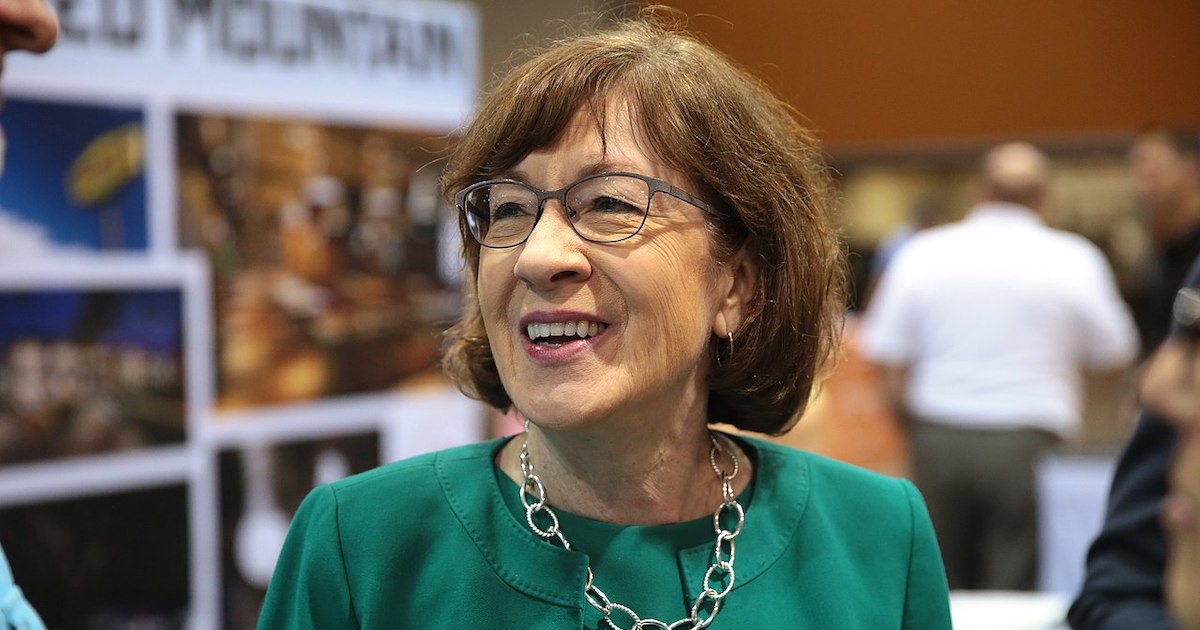Key actions and positions posted on the intersection of disability and education, jobs, immigration, climate crisis, criminal justice and more

Portland, ME, Sept. 8 – In response to RespectAbility’s 2020 Disability Voter Questionnaire for Senate and Governor Races, Maine’s Republican Senator and embattled incumbent Susan Collins has responded with the following letter detailing some of her major legislative accomplishments, her past efforts to support Mainers with disabilities and her vision for the future of this country. The questionnaire is from RespectAbility, a nonpartisan nonprofit disability organization that does not endorse candidates. The questionnaire is purely for educational purposes. RespectAbility has reached out to key Senate and gubernatorial campaigns on both sides of the aisle and will be posting all responses on The RespectAbility Report.
While Sen. Collins did not answer each question directly, the full text of her letter follows:
Dear Mr. Kahn-Pauli,
Thank you for reaching out to inquire about RespectAbility’s policy priorities. I believe that actions speak louder than words, which is why it is my policy to allow organizations to grade me on my voting record, rather than on answers to questionnaires.
I welcome the opportunity to share my record in support of full community engagement for the one out of five Americans living with disabilities. This minority is the largest in the nation, and unique in that it is the only type that any individual can join at any point in their lives. As Senator and as Chairman of the Senate Aging Committee, I have long advocated for policies to promote equal opportunities and inclusive services for people with disabilities from childhood to senior years. We have made strides to improve education, employment, healthcare, and housing for people with disabilities. Now, in light of the COVID-19 pandemic, which has exacerbated disparities, we must further advance public policies to promote inclusion for those living with disabilities, and I’m committed to achieving this goal.
As education has moved to virtual settings in many communities across the country, students with disabilities may face additional challenges. I have developed policies to ensure that these students have seamless access to the technologies they need to succeed. Along with Senator Bob Casey (D-PA), I co-authored the 21st Century Assistive Technology Act, which would strengthen and reauthorize comprehensive, statewide, and consumer-responsive programs to make assistive technology devices and services more available and accessible to individuals with disabilities and their families. I also introduced along with Senator Doug Jones (D-AL), the American Broadband Buildout Act of20l9, a bipartisan bill to ensure that rural Americans have access to broadband services at speeds they need to fully participate in school, and all aspects of the modem society and economy by directing the Federal Communications Commission (FCC) to provide up to $5 billion in matching grants to help states improve broadband infrastructure. I have also long been a strong advocate for IDEA, the landmark law that has provided breakthrough opportunities for children with disabilities and helped many of these students reach their full potential. These policies support the full inclusion of Americans with disabilities year-round, and have become particularly vital to helping students with disabilities succeed during the pandemic.
I have also worked to advance policies to support people with disabilities in the workplace and remove barriers to obtaining meaningful careers. Unemployment data pre- COVID show that we can do better — while nearly three quarters of Americans without disabilities were employed, only a third of those with disabilities had jobs. I have examined this issue through a series of hearings on the Aging Committee as well as an extensive, bipartisan report issued in December 2017, “America’s Aging Workforce: Opportunities and Challenges”. This report investigates challenges facing older workers, particularly those with disabilities, and highlights the business case for hiring, retaining, and supporting these workers, as well as policies that benefit workers and their families. These policies would allow for the flexibility of individuals to carve their own career paths, allow employers the flexibility to creatively meet the individual needs of their workers, and support family caregivers.
Ensuring that people with disabilities have access to competitive and meaningful employment opportunities is not enough. We must also advance policies to help those with disabilities to save and achieve financial security. In December 2018, I chaired a hearing on this topic, “Supporting Economic Stability and Self-Sufficiency as Americans with Disabilities and their Families Age”. This hearing highlighted the success of ABLE accounts, a program created by legislation that I supported six years ago, the Stephen Beck, Jr. Achieving A Better Life Experience Act. These accounts allow individuals with a disability diagnosis by age 26, and their families, to establish tax-advantaged savings accounts. Similar to the 529 college savings plans, these savings accounts can be used to set aside contributions to cover qualified expenses such as education, housing, and transportation. Being able to save money to make necessary modifications to a car, or a home, or just to pay for unexpected life events can preserve the independence of individuals with disabilities, and ensure financial security into the future.
The data demonstrate that we have a long way to go. Prior to COVID-19, approximately 27 percent of Americans with disabilities lived in poverty, the highest rate of any subgroup in the country. The massive economic instability as a result of the pandemic may have even more devastating consequences for those with disabilities and their families. This underscores the urgent need to provide these individuals with more opportunities for financial freedom and stability, particularly during their older years.
In healthcare, I have worked tirelessly to protect people with disabilities. In 2017, I was one of three Republicans to vote against ACA repeal, largely out of concern for those with pre- existing conditions. Since then, I have also voted to block the new CMS regulations that expand limited duration insurance plans because such plans generally do not provide protections for enrollees with pre-existing conditions. At multiple junctures, I have urged the Department of Justice (DOJ) to defend critical consumer protections for pre-existing conditions, and I am committed to continuing to stand up for these critical rights. I have introduced the Premium Reduction Act of20l9, C th Senator Joe Manchin (D-WV), which would make health insurance in the individual market more affordable by expanding state-based programs that have proven to lower premiums and save consumers money. This legislation would protect people with pre- existing conditions, and I will continue to vote against any bills that would strip this fundamental protection.
As Chairman of the Aging Committee, I have also worked to shed light on aging with disabilities. While public policy has historically focused on children and young adults with disabilities, older adults with disabilities are a growing population, and often have unique needs. In leading the 2020 reauthorization of the Older Americans Act this past year with a coalition of bipartisan members of Congress, I worked to ensure that those aging with disabilities could benefit, particularly by making it easier for disability organizations to tap into aging resources. From economic stability to reliable healthcare, I am committed to supporting people with disabilities.
True equality can only be achieved by including people with disabilities in meaningful roles in all aspects of society, especially public service. Over the years, I have hired many Americans with disabilities to join my staff, and they bring valuable perspectives that consistently strengthen the services that my office provides. In the future, I am committed to continuing this tradition. It is through leading by example, coupled with enlightened public policies that we can combat stigmas and ensure that those living with disabilities have the same opportunities to dream and achieve their dreams.
Sincerely,
Susan M. Collins
Sen. Collins currently is facing off against Democratic rising star and Speaker of the Maine House of Representatives Sara Gideon in this year’s closely watched election for the U.S. Senate. Speaker Gideon recently answered the RespectAbility Disability Questionnaire and you can find her responses on our website here.
RespectAbility is a nonprofit, nonpartisan organization that fights stigmas and advances opportunities so people with disabilities can fully participate in all aspects of their communities. RespectAbility does not rate or endorse candidates. View more coverage of 2020 candidates.

[…] Read Response […]
[…] Collins completed the 2020 Disability Voter Questionnaire for presidential, Senate and gubernatorial candidates put out by the national disability […]
[…] beating Democratic challenger Gov. Steve Bullock. And in Maine, incumbent Republican Sen. Susan Collins has won a hotly contested race to continue serving in the U.S. Senate, beating Democratic […]